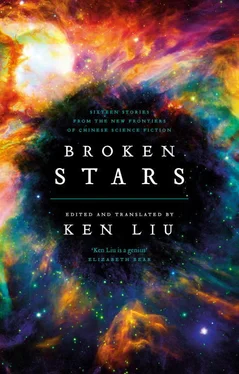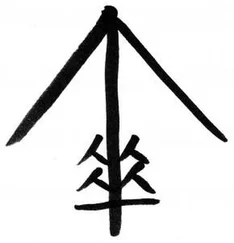If not for fate, why would he pass by just then? If not for fate, how could he have been able to light the fire in the gale?
Xiaobo will loosen the rope and let Lina down. Her body will still be warm, filled with the scent of summer. Her natural, tanned skin will glow and be filled with the elasticity of youth. He’ll be especially attracted by her round, smooth legs, covered by her excrement. On that night, he’ll experience unprecedented levels of hunger and obsession, his blood boiling in his veins. Death will swell his blood vessels, will make him feel harder and stiffer than he’s ever felt. By the time his hands reach into her blouse, greedily kneading those chocolate breasts, he’ll no longer be an insect driven mad by the rotten stench of the corpse flower. He’ll no longer be lost. He’ll have encountered himself. He’ll lick those purple lips, and then gently wind himself around that tongue, again and again, tirelessly. That will be how he confirms who he is. He’ll understand what he fears; he’ll know what he yearns for; he’ll know himself.
My frail lover, come to me. We’ll be bonded together on a foundation of evil.
From now on, you can blame me the way you blame fate.
I am your star.
*
As I smile at the mirror, I know he’s looking at me from behind it. He’s now trapped in the cell he built himself.
On the table is the meal I prepared for him. “This is made from the flesh of the pale woman. You’ll be eating the same thing for a few years.” I told him the truth, and now I’m waiting here, patiently, on the other side of the mirror. I know he’ll start eating sooner or later.
He’ll think that I’ve moved his stars, making him eat it.
But he’ll be wrong. I haven’t moved his stars at all. From the moment of his birth, his stars have said that he’ll consume the pale woman.
*
“When you move the stars, you change fate. When you move the stars, you also break them. Don’t move the stars lightly.”
Those were the pale woman’s final words to me before she died.
Many stars have been broken tonight, and many more will break in the future. Even so, the sky will never be completely dark.
There will always be a star that remains eternally lit. A star that doesn’t need my guidance.
Han Song is often described as one of the China’s most influential older science fiction writers (along with figures like Liu Cixin and Wang Jinkang). He has won many awards and published multiple novels as well as collections of short fiction. Few of his works, however, have been translated into English—something I hope will be remedied soon.
As a senior member of Xinhua, China’s state news agency, Han Song occupies a unique position as an observer and chronicler of the cataclysmic changes transforming China. There are things he can say that perhaps no other writer can say. He has suggested, using various phrasing, that what is happening in China is more surreal and shocking than has been seen in (or could be captured by) science fiction. Like many of his stories, this sentiment is subject to multiple interpretations, some of which are mutually contradictory.
He has a distinctive style and voice that is instantly recognizable: a preference for cumulative, run-on sentences and dense paragraphs that build and build, threatening to teeter over, bringing to mind the urban landscape of contemporary China; a narrative voice that offers mordant, acerbic metafictional commentary; a cool, detached tone that describes surreal suffering as though cataloguing species of flowers; a knack for imagery that hovers on the edge of horror and humor, pathos and bathos, realism and transrealism.
“Submarines” and “Salinger and the Koreans” are both short but showcase Han Song’s style well.
Some commentators describe Han Song as a dystopian writer who uses science fiction to critique China’s breakneck pace of development that leaves behind millions of victims. Others view him as a nationalist who uses his fiction to lacerate and mock Western hypocrisy. Some see in his stories a continuation of Lu Xun’s bitter attacks against the dark aspects of Chinese history and culture. Others think he’s railing against a Chinese modernity that is without values or ideals.
What is clear to me is that all of Han Song’s stories are intensely political, but they’re couched in layers of allegory such that what message one takes away from them depends largely on what baggage one brings to them.
As a boy, whenever I asked, my parents would bring me to the shore of the Yangtze River to see the submarines. Following the river’s flow, the subs had come to our city in herds and pods. I heard that some subs also came from the Yangtze’s tributaries: Wujiang River, Jialing River, Han River, Xiangjiang River, and so on. The subs were so numerous that they looked like a carpet of ants or thousands of wisps of rain-soaked clouds fallen from the heavens.
From time to time, to my amazement, one sub or another would just vanish from the surface. In fact, they had dived. First, the sub slowly wriggled its immense body, which then sank inch by inch, roiling the water around it in complicated and cryptic ripples, until the whole hull disappeared beneath the surface, including the tiny column on top shaped like a miniature watchtower. The flowing river soon recovered its habitual tranquility and mystery, leaving me stunned.
And then, a submarine would explode out of the water like a monster, splashing beautiful waves in every direction. “Look! Look!” I would scream. “It’s surfacing!” But my parents never reacted. Their faces remained wooden, looking as dispirited as two houseplants that hadn’t been watered for weeks. The appearance of the submarines seemed to have robbed them of their souls.
Most of the time, the subs remained anchored on the placid surface, motionless. Wires were strung over the hulls, stretching from tower to tower. Drying laundry hung from the wires like colorful flags, pants and shirts mixed with cloth diapers. Women in thick, crude aprons cooked with coal stoves on the decks, and the smoke columns turned the river into a campground. Sometimes the women squatted next to the water, beating the laundry with wooden bats against the sturdy metal hulls. Occasionally, old men and women climbed out of the subs, looking relaxed as they sat with their legs curled under them, smoking long-stemmed pipes with a cat or a dog curled up against them.
The subs belonged to the peasants who had come to our city to seek work. After a day of working in the city, the peasants returned to their submersible abodes. Before the arrival of the subs, peasant laborers had to rent cheap apartments in urban villages, plots of land where the rural population stayed as their farmlands were gobbled up by developers for the expanding city, leaving them stranded in a sea of skyscrapers. The urban villagers rented out one-foot-wide spaces on communal beds, and the rural laborers who built the city had to sleep like pigs or sheep in a pen. The submarines, on the other hand, gave the laborers their own homes.
Ferries operated between the shore and the anchored subs. Peasants piloted these ferryboats, shuttling their brothers and sisters between two completely different worlds. At night, after everyone had returned to their homes, the subs were at their most beautiful. Lit by gas lamps, each boat glowed with a different pattern, like paper-cutting pasted on windowpanes. Bright, lively, they also reminded me of fallen stars adrift on the river. On each sub, a family sat around the table having supper, and the cool river breeze brought their laughter and chatter to the shore, leaving the urban residents with a sense of strange envy. As the night deepened, lights on the vessels winked out one by one until only the anxious searchlight beams from the harbor towers roamed the darkness, revealing motionless hulls like sleeping whales. Many subs, however, chose this time to disappear. Each sweep of the searchlight showed fewer and fewer boats. Without any announcement, they had dived, as if the peasants couldn’t sleep soundly without the comfort of being covered by water, like water birds that had to tuck their heads beneath their wings to nap. Only by submerging their families and homes could they leave their worries behind on the surface, hold danger and uncertainty at bay, and dream sweet dreams without being bothered by the city-dwellers—was that, in fact, the reason they had built the submarines in the first place?
Читать дальше












